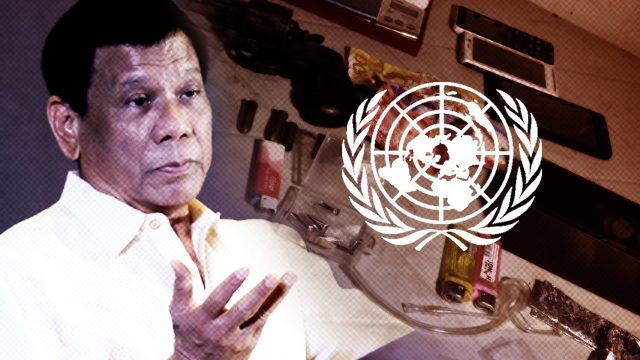SUMMARY
This is AI generated summarization, which may have errors. For context, always refer to the full article.

MANILA, Philippines – The Commission on Human Rights on Friday, March 2, reminded the administration of President Rodrigo Duterte that the Philippine government should “obey lawful orders” if it wants to show the rule of law still prevails in the country.
“We are a nation of laws and we put premium on the rule of law as well as its primacy,” CHR Spokesperson Jacqueline de Guia said in a statement.
“We remind the government especially the security sector, that there is a need to show that the rule of law still prevails and the law requires them to obey lawful orders,” she added.
On Thursday, March 1, Duterte ordered the Philippine National Police to ignore the United Nations rapporteurs who will be sent to investigate human rights abuses under his administration, adding that they have no right to “interfere in the way I would run my country.”
This latest move by the administration has been criticized by critics as an indication it wants to evade responsibilities in relation to the high number of killings under the violent anti-drug campaign since July 2016. (READ: Drug war in 2017: The year of deaths and denials)
Data from the government show that at least 3,987 individuals have been killed in anti-drug operations, while the number of those killed vigilante-style is still highly contested – with human rights groups estimating the figure could be more than 12,000.
Foreign Secretary Alan Peter Cayetano had previously said the Philippines will not allow Callamard to investigate because of her “bias and antagonistic stance” towards the government. It would want a different UN rapporteur to investigate, according to Presidential Spokesperson Harry Roque.
CHR, however, reminds the government that it is a signatory to various international treaties – such as being part of the UN Human Rights Council – which makes it “duty-bound” to certain guidelines and measures. This includes being open to investigations and cooperating with UN special rapporteurs and other experts.
“In the end, it will ultimately redound to the benefit of the government if it is able to show its adherence to the rule of law, as there shall be no need for any intervention anymore,” De Guia said.
Human Rights Watch (HRW) previously told Rappler that the Philippines can be kicked out of the UN Human Rights Council if it does not fulfill its responsibilities.
“Membership comes with responsibilities,” HRW Geneva director John Fisher said. “The Philippines is expected to fulfill its membership obligations such as to uphold human rights standards and cooperate with UN mechanisms such as the Special Rapporteurs.” – Rappler.com
Add a comment
How does this make you feel?
There are no comments yet. Add your comment to start the conversation.